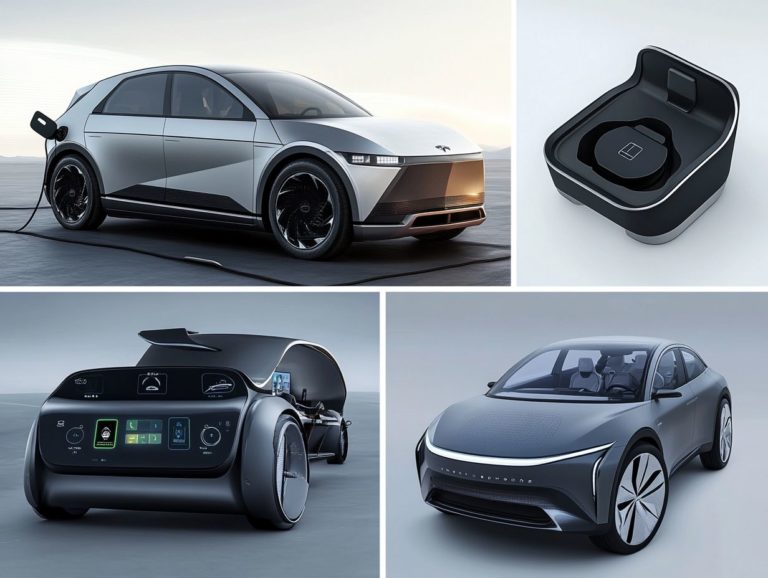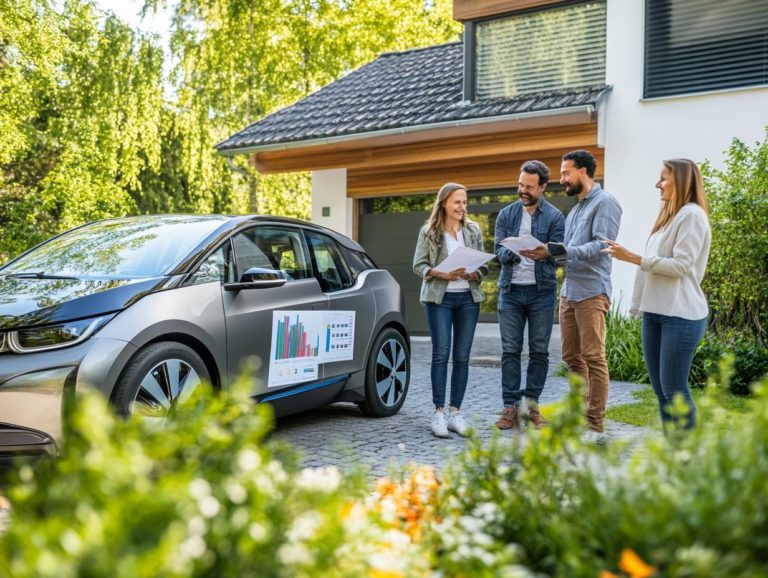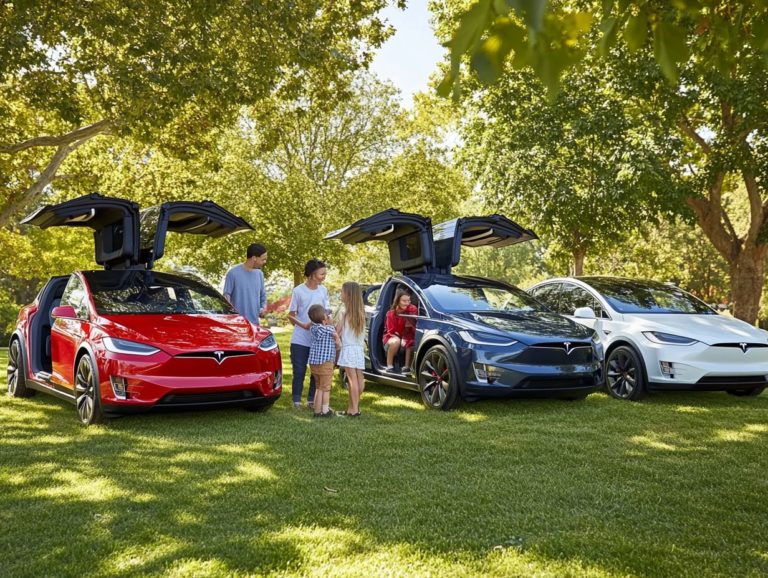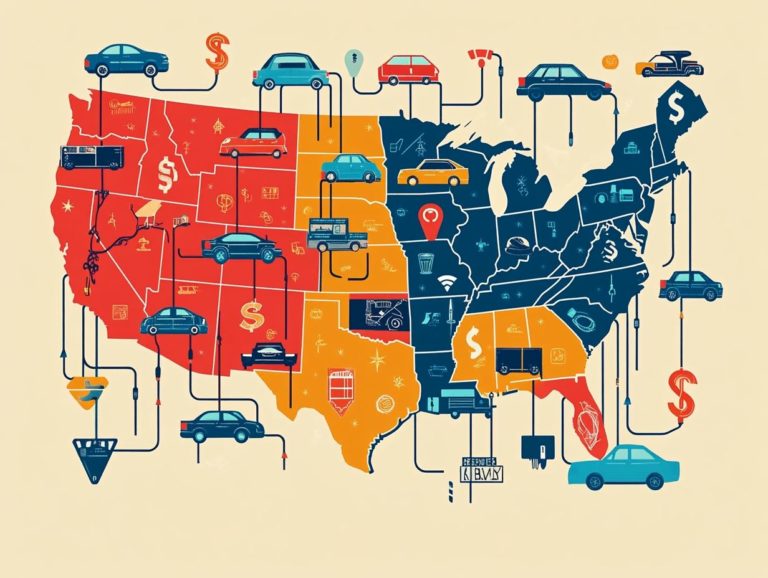Understanding the Impact of EVs on Insurance
The rise of electric vehicles (EVs) is reshaping the automotive landscape and the insurance industry. As you witness the acceleration in EV adoption, insurers are recalibrating their risk assessments and coverage options to accommodate these innovative vehicles.
This article explores the evolving EV market, highlighting the challenges and opportunities that insurers encounter. It navigates the regulatory landscape and government incentives shaping the future. Discover how the insurance industry is adapting to this transformation and what it signifies for the road ahead.
Contents
- Key Takeaways:
- The Rise of Electric Vehicles (EVs)
- Impact on the Insurance Industry
- Challenges for Insurers
- Opportunities for Insurers
- Regulations and Government Incentives
- Future of EVs and Insurance
- Frequently Asked Questions
- What is the impact of EVs on insurance?
- Do EVs have lower insurance rates compared to traditional vehicles?
- What factors influence insurance rates for EVs?
- Do EVs have different insurance requirements compared to traditional vehicles?
- How does the cost of insurance for EVs compare to traditional vehicles?
- What should I consider when purchasing insurance for my EV?
Key Takeaways:

- Electric vehicles are growing rapidly, impacting the insurance industry.
- Insurers face challenges in adapting to EVs, including changes in risk assessment and coverage.
- Despite the challenges, opportunities exist for insurers to offer new products and services for EVs, supported by potential government incentives and regulations.
The Rise of Electric Vehicles (EVs)
The rise of electric vehicles (EVs) signifies a remarkable transformation in the automotive landscape, driven by advances in battery technology and consumer preference for eco-friendly options. As awareness of environmental impacts grows, many drivers are gravitating toward electric choices like the Tesla Model 3 and the Toyota Prius.
This shift not only reshapes the market but also transforms driving habits, encouraging a more sustainable future.
Overview of the EV Market
The electric vehicle market is experiencing rapid growth, fueled by rising sales trends and increasing consumer interest in sustainable transportation options. Major manufacturers are ramping up production and unveiling a wide array of models from compact cars to spacious SUVs.
In recent years, sales figures have soared, with industry leaders like Tesla, Ford, and Volkswagen making significant advancements.
This shift creates new opportunities and challenges, prompting many insurance companies to reassess their strategies to better serve electric vehicle owners. Thanks to improvements in technology and charging stations, insurers are crafting innovative policies designed specifically for EVs.
Impact on the Insurance Industry
The rise of electric vehicles is transforming the insurance landscape, prompting the development of innovative insurance policies and a reevaluation of how premiums are determined for EV owners.
Changes in Risk Assessment and Coverage
As electric vehicles gain popularity, insurance providers are rethinking their risk assessment strategies and coverage options to cater to the unique needs of electric car owners.
This transformation is driven by the distinctive aspects of EVs, such as their advanced battery technology and higher repair costs. These factors require a fresh perspective on traditional risk factors. The evolving landscape of charging stations and the significant differences in driving patterns between EVs and conventional vehicles present new challenges for insurers.
As these vehicles increasingly incorporate smart technology features, understanding potential vulnerabilities becomes crucial for policyholders.
Insurers must formulate policies that cover not only the physical aspects of EVs but also address technology risks and emerging market trends, ensuring comprehensive protection in this dynamic landscape.
Challenges for Insurers
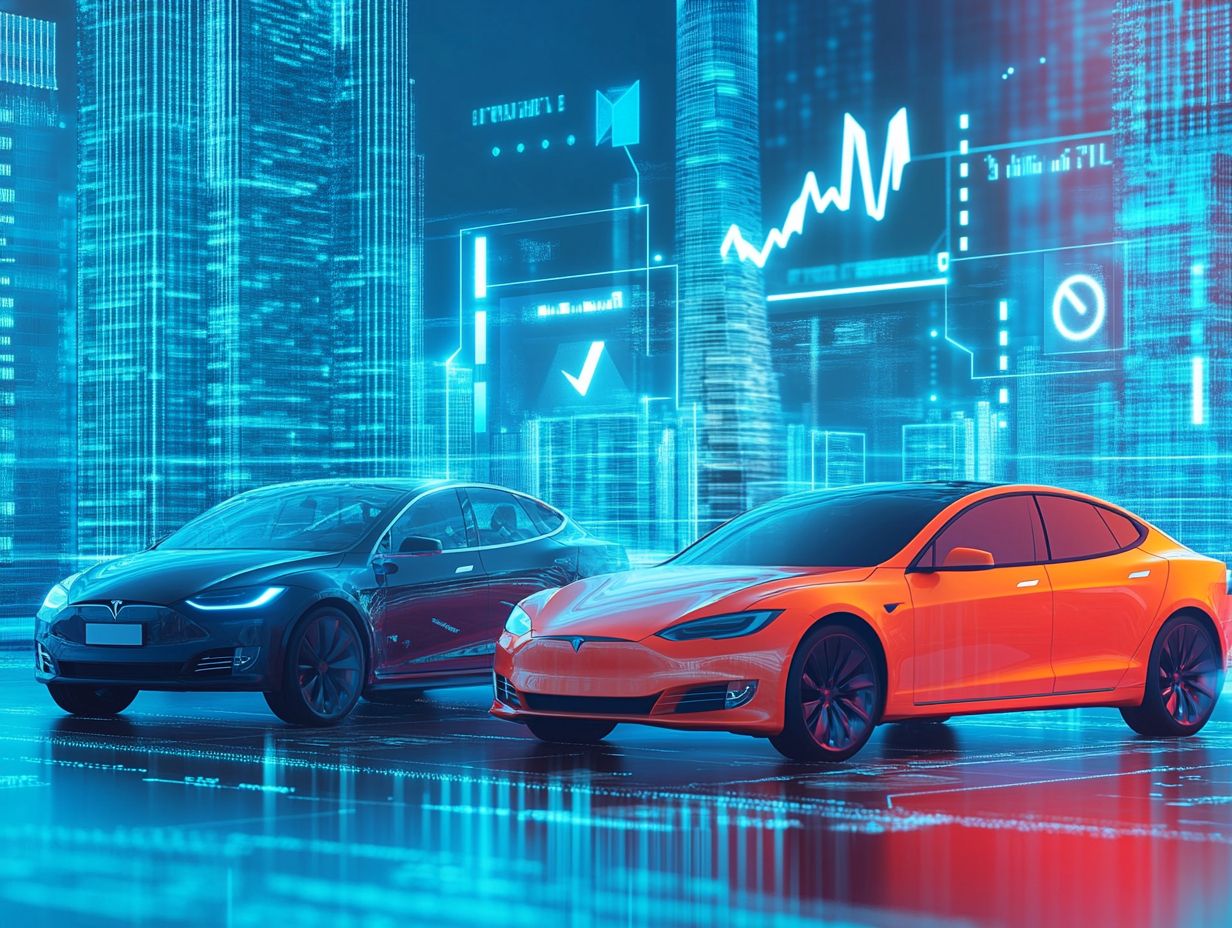
Insurers face a variety of challenges as they navigate the increasing prevalence of electric vehicles in the market. You ll encounter fluctuating insurance rates and a pressing need for specialized repairs among the complexities that require attention.
Adapting to EVs in the Market
To stay competitive, you must adapt to market trends by developing innovative insurance options specifically tailored for electric vehicle policies.
This adaptation calls for a multifaceted approach that addresses the unique characteristics of electric vehicles and meets the specific needs and concerns of their owners. For instance, consider creating comprehensive coverage plans that take into account battery life, charging infrastructure, and the distinct risk profiles associated with electric cars. Leveraging driving data information collected from vehicles to understand driving habits can provide you with valuable insights into driving behavior, allowing you to offer personalized premiums and discounts.
By understanding the concerns of EV owners like potential battery damage or the complexities of home charging setups you ll be well-positioned to build trust and offer relevant support in this evolving market.
Opportunities for Insurers
The surge of electric vehicles opens a wealth of opportunities for you as an insurer to craft customized insurance products that cater specifically to EV owners. By embracing this trend, you can harness various incentives to enhance your offerings and attract a new clientele in the growing electric vehicle market.
New Products and Services
Insurers are now rolling out a range of innovative products and services tailored specifically for electric vehicle owners. These come complete with enhanced coverage options and attractive insurance discounts.
These offerings frequently include specialized collision coverage that considers the unique components of EVs, such as battery systems and advanced sensors. Many insurers are introducing enticing rebates for electric vehicles, encouraging you to make the switch to greener transportation options. Numerous companies also provide insurance incentives for eco-conscious driving habits, rewarding you for prioritizing safety and energy efficiency.
This personalized approach not only elevates your customer experience but also mirrors the broader industry shift toward sustainability in the rapidly evolving automotive landscape.
Regulations and Government Incentives
Regulations and government incentives significantly shape the landscape for adopting electric vehicles, impacting both consumer behavior and the dynamics of the insurance market.
By understanding these elements, you must navigate the evolving environment and make informed decisions that align with your values and financial interests.
Impact on Insurance Industry

The insurance industry is undergoing remarkable transformations, driven by new regulations and government incentives that aim to promote the adoption of electric vehicles.
These initiatives foster a transition toward greener transportation and urge you to reconsider your pricing strategies and coverage options. With the demand for electric vehicles skyrocketing, it s becoming increasingly vital for insurers to craft tailored policies that account for the unique characteristics and risks of these vehicles. This shift has spurred competitive pricing models and innovative coverage plans designed specifically for eco-conscious consumers.
Moreover, regulatory frameworks focused on enhancing public safety and environmental protection encourage insurers to weave sustainability factors into their underwriting processes, fundamentally reshaping how policies are structured and presented.
Future of EVs and Insurance
The future of electric vehicles is set to bring significant transformation to the insurance industry, influenced by cutting-edge advancements in battery technology and shifting market dynamics.
As these vehicles become more prevalent, their impact will reshape how insurance is approached. You need a forward-thinking perspective to navigate this evolving landscape.
Predictions and Potential Changes
Future predictions suggest that as an electric vehicle (EV) owner, your insurance premiums may evolve based on changes in driving habits and environmental factors.
As more people make the switch to electric vehicles, insurers will likely reassess their pricing plans. They will consider lower maintenance costs and the reduced frequency of accidents associated with EVs.
This change could lead to more competitive premiums aimed at attracting eco-conscious drivers like you, along with new coverage options tailored specifically for electric models.
With a stronger focus on sustainability among consumers, insurers may offer incentives or discounts for choosing lower-emission vehicles, ultimately affecting policy structures and overall risk evaluations in the market.
Frequently Asked Questions
Here s what you need to know about insurance for electric vehicles:
What is the impact of EVs on insurance?
Electric vehicles (EVs) significantly affect insurance rates. Since they are new technology, insurance companies are still determining how to properly insure and assess risks for them.
Do EVs have lower insurance rates compared to traditional vehicles?

This can vary by insurance company and specific EV model. Generally, EVs tend to have lower insurance rates due to their lower maintenance costs and the lower risk of accidents.
What factors influence insurance rates for EVs?
- Cost of the vehicle
- Battery replacement costs
- Availability of repair shops for EVs in your area
Do EVs have different insurance requirements compared to traditional vehicles?
Yes, EVs may require different insurance coverage, particularly for their batteries and electrical components. Make sure to check with your insurance provider to confirm you have the right coverage for your EV.
How does the cost of insurance for EVs compare to traditional vehicles?
The cost of insurance for EVs varies depending on the model and insurance company. Generally, EVs could have lower insurance rates due to their lower risk of accidents and lower maintenance costs.
What should I consider when purchasing insurance for my EV?
When buying insurance for your EV, think about the following factors:
- Cost of the vehicle
- Battery replacement costs
- Available repair shops
- Specific coverage and requirements for EVs from your insurance provider
Explore your insurance options for electric vehicles and get quotes to find the best coverage tailored to your needs.

